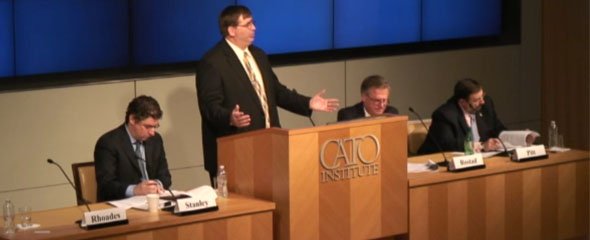
“I just want to keep this real simple,” began Ron Rhoades. “Brokers are fiduciaries. They always have been, and they always will be.” In a panel discussion co-hosted by the Cato Institute and the Institute for the Fiduciary Standard, Rhoades highlighted the idea that when an investor relies on a professional’s personalized advice, they enter a fiduciary relationship based on trust and confidence.
So why is it, the panel was asked, that brokers are held to a far less stringent legal standard than RIA’s? And what would the investment industry look like if advisors and brokers were held to the same standard?
Besides Rhoades, an assistant professor at Alfred State College and SUNY College of Technology, the panel featured Knut Rostad, president of the Institute for the Fiduciary Standard and panel moderator; Harvey Pitt, Former SEC chairman; and Marcus Stanley, Policy Director of Americans for Financial Reform. A video or podcast of the panel can be found below.
The concept of brokers as fiduciaries is supported by some notable cases. Rhoades, for example, quotes the NASD (now FINRA), as saying “essentially a broker, or agent, is a fiduciary, and he thus stands in a position of trust and confidence with respect to his customer or principle.” Rostad also referenced the SEC Arlene Hughes case and Chairman Pitt referenced a 1937 case where judge Learned Hand said “Brokers/dealers are agents, therefore they are fiduciaries.”
“(The fiduciary standard) is a far greater, larger issue… than how advisors should be regulated, it is about how well is our free market economy working.” said Knut Rostad. Customers of financial services are not aware that they may be receiving conflicted advice, and indeed are given an over-inflated sense of trust due to branding and ad campaigns. When investors lack “trust based on conduct that is untrustworthy,” Rostad continued, “the economy simply will not operate as well. Distrust adds costs and inefficiencies.”
Harvey Pitt agreed with this thought, and supported it with his years of experience as SEC chairman. “[Investors] have to take responsibility for themselves,” he said, “but they shouldn’t be at the mercy of professionals who are unscrupulous. And believe me… people do terrible things, and those people should have the full force of law come smack down on them.” He said that many customers do not understand the legal differences of brokers, dealers and advisors, but regardless should be able to trust that the professional has their best interest at heart.
Besides protecting investors, the panelists agreed that holding brokers who render personalized investment to the fiduciary standard would help restore confidence in the financial services industry. Marcus Stanley explained that investors are being sold complex derivatives, similar to the ones that caused the 2008 recession. These are “an ideal vehicle for sell-side insiders to take advantage of their superior knowledge by offloading bad deals onto retail customers.”
Rhoades identified the issue as “huge mistrust” for Wall Street: “…The problem is, if we don’t have trust in our system, we don’t have [individual investors] participate in our capital markets… and that will result in reduced economic growth in our country.” This issue, he claimed, was one of the big problems behind the collapse of the Greek economy.
Despite nuanced differences, all the panelists agreed that applying a fiduciary standard to brokers would address these problems and build confidence in the markets. Though they disagreed on precisely how to implement it and how strict of a standard to use, the consensus was that this kind of legal protection for investors is essential.

